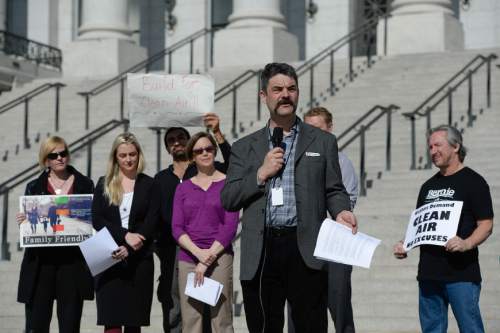This is an archived article that was published on sltrib.com in 2016, and information in the article may be outdated. It is provided only for personal research purposes and may not be reprinted.
On the heels of the worst air pollution event Utah has seen in years, activists descended on the Capitol on Tuesday to take sides on a trio of bills dealing with emissions from buildings.
Only one of those proposals was heard Tuesday — HB316, which would require high-efficiency lighting in new buildings, as well as reinstate the Utah Air Quality Board's rule limiting in-state sales of water heaters to models that qualify as low-nitrogen oxide emitters.
That rule was placed last fall on a sunset list that would cause it to expire before taking effect unless legislative action removes it from the list.
HB316 — sponsored by Rep. Brad Wilson, R-Kaysville — would also increase the interval at which the state legislature reviews the Utah building code, and restrict the circumstances under which the Utah Department of Environmental Quality can create regulations that might overlap with the building code.
Environmental groups have criticized Wilson's bill, which proposes to adopt some components — but not all — of the energy conservation code recommended by the Uniform Building Commission, the body responsible for the preliminary review of the building code in Utah.
The House Business and Labor Committee voted 11-2 to recommend the bill despite its numerous opponents, many of whom were unable to speak due to time constraints.
Those who did speak in favor of the bill characterized it as a good compromise that balances the interests of diverse stakeholders. The opposition cited everything from negative environmental consequences, incomplete cost-benefit analyses, disproportionate harm to low-income population, and government overreach as reasons the bill should not pass.
"HB316 has multiple provisions that have not been properly vetted by the Uniform Building Commission," said Brian Romney, a local member of the International Code Council. "Is [this hearing] enough time to thoroughly vet this bill? No. ... There are too many overreaching and unintended consequences of this bill."
One of those consequences, said Ed Blake, a local executive director for Habitat for Humanity, could be a decline in the quality of housing available to low-income families.
During a press conference and demonstration just prior to the hearing, environmentalists cited numbers from the Utah Division of Air Quality that indicate that "area sources" of emissions — a definition that includes homes and other buildings — account for 40 percent of emissions on the Wasatch Front, and decried the bill as "a step backward for air quality."
"Representative Wilson said [that] to him, it seemed like we were reviewing the building code every year, as if reviewing the building code were overly burdensome and taxing," said Ingrid Griffee, executive director of Utah Moms for Clean Air. "I'm here to say that air pollution is burdensome and taxing on my family's health and on the health of all Utah's children."
Ashley Miller, program director for Breathe Utah, called out HB316 for limiting the ability of state environmental agencies to regulate pollution from homes and businesses.
Wilson said during the hearing that he is still in the process of "massaging" his bill language to meet the needs of the Utah Department of Environmental Quality. In its current form, the bill would prevent state agencies from adopting rules related to the building code after the end of the year, "except as provided by state law," he said.
"If DEQ wants to put in place some kind of rule, they have a process," he said. "They need to use the same process everyone else does."
While objecting to HB316, Miller said something should be done to update Utah's building code, which she called "alarmingly outdated."
"I think we can all agree that last week's inversion is the proof that we need to do everything we can to improve this tragic situation," she said. "We cannot continue to rely on weather patterns to clear out the air. We need to take responsibility, and not pollute the air. Updating the building code is the easiest, most cost-effective way to prevent increases in air pollution."
Environmentalists spoke more favorably of the two alternatives to HB316, which have yet to be heard by a committee.
One, sponsored by Rep. Edward Redd, R-Logan, would reinstate the Air Quality Board's water heaters rule. The other, sponsored by Rep. Becky Edwards, R-North Salt Lake, would adopt the 2015 Energy Conservation Code in its entirety.
Edwards said her bill was part of an overall effort to enable the state to make incremental progress on air quality.
"Part of what we look at in terms of improving our air quality is industrial sources, and we have a lot going on in terms of vehicle emissions … this is another piece of the puzzle," she said. "There's not going to be one silver bullet, as they say, and this is going to be another way that we can significantly reduce emissions in the area sources."
If adopted in its entirety, the energy code suggested by the Uniform Building Commission has the potential to reduce local air pollution by 2.3 million pounds over the next 30 years, Edwards said.
The legislature, she said, needs to trust the recommendations that come from the agencies and divisions that the state has empowered to make regulations.
"I think for us to ignore what those recommendations are is possibly irresponsible on our part as a state," she said.
Twitter: @EmaPen



